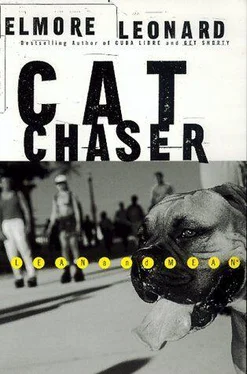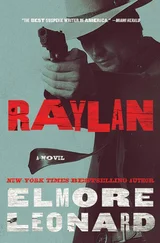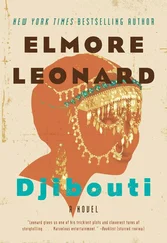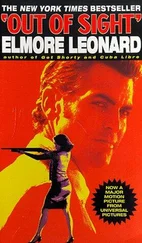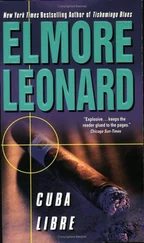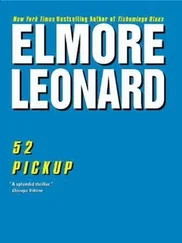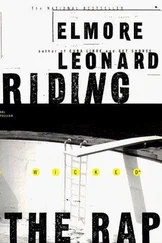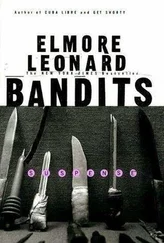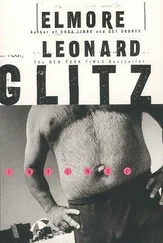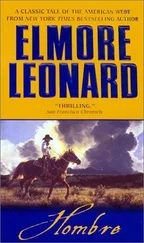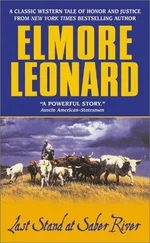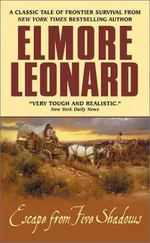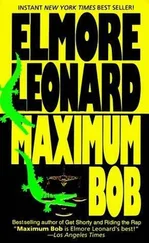Amis:So, when you say it’s character-driven, do you mean you’re thinking, How would this character see this scene? Because you’re usually third-person. You don’t directly speak through your characters, but there is a kind of third-person that is a first-person in disguise. Is that the way you go at it?
Leonard:It takes on somewhat of a first-person sound, but not really. Because I like third-person. I don’t want to be stuck with one character’s viewpoint, because there are too many viewpoints. And, of course, the bad guys’ viewpoints are a lot more fun. What they do is more fun. A few years ago, a friend of mine in the publishing business called up and said, “Has your good guy decided to do anything yet?” [Laughter]
Or, I think I should start this book with the main character. Or I start a book with who I think is the main character, but a hundred pages into the book I say, “This guy’s not the main character; he’s running out of gas; I don’t even like him anymore, his attitude; he’s changed.” But he’s changed and there’s nothing I could do about it. It’s just the kind of person he is. So then I have to bring somebody along fast. Do you run into that?
Amis:What I do find, and my father Kingsley Amis used to find, is that when you come up against some difficulty, some mechanism in the novel that isn’t working, it fills you with despair and you think, “I’m not going to be able to get around this.” Then you look back at what you’ve done, and you find you already have a mechanism in place to get you through this. A minor character, say, who’s well placed to get the information across that you need to put across. I always used to think (and he agreed) that, thank God writing is much more of an unconscious process than many people think.
I think the guy in the street thinks that the novelist, first of all, decides on his subject, what should be addressed; then he thinks of his theme and his plot and then jots down the various characters that will illustrate these various themes. That sounds like a description of writer’s block to me. I think you’re in a very bad way when that happens. Vladimir Nabokov, when he spoke about Lolita , refers to the “first throb” of Lolita going through him, and I recognize that feeling. All it is is your next book. It’s the next thing that’s there for you to write. Now, do you settle down and map out your plots? I suspect you don’t.
Leonard:No, I don’t. I start with a character. Let’s say I want to write a book about a bail bondsman or a process server or a bank robber and a woman federal marshal. And they meet and something happens. That’s as much of an idea as I begin with. And then I see him in a situation, and I begin writing it and one thing leads to another. By page 100, roughly, I should have my characters assembled. I should know my characters because they’ve sort of auditioned in the opening scenes, and I can find out if they can talk or not. And if they can’t talk, they’re out. Or they get a minor role.
But in every book there’s a minor character who comes along and pushes his way into the plot. He’s just needed to give some information, but all of a sudden he comes to life for me. Maybe it’s the way he says it. He might not even have a name the first time he appears. The second time he has a name. The third time he has a few more lines, and away he goes, and he becomes a plot turn in the book.
When I was writing Cuba Libre , I was about 250 pages into it and George Will called up and said, “I want to send out forty of your books” – this was the previous book [ Out of Sight ] – “at Christmastime. May I send them to you and a list of names to inscribe?” I said, “Of course.” He said, “What are you doing now?” I said, “I’m doing Cuba a hundred years ago.” And he said, “Oh, crime in Cuba.” And he hung up the phone. And I thought, “I don’t have a crime in this book.” And I’m 250 pages into it. [Laughter] It was a crime that this guy was running guns to Cuba, but that’s not what I really write about. Where’s the bag of money that everybody wants? I didn’t have it. So, then I started weaving it into the narrative. I didn’t have to go back far, and I was on my way.
Amis:I admire the fluidity of your process because it’s meant to be a rule in the highbrow novel that the characters have no free will at all. E.M. Forster said he used to line up his characters before beginning a novel, and he would say, “Right, no larks.” [Laughter] And Nabokov, when this was quoted to him, he looked aghast, and he said, “My characters cringe when I come near them.” He said, “I’ve seen whole avenues of imagined trees lose their leaves with terror at my approach.” [Laughter]
Let’s talk about Cuba Libre , which is an amazing departure in my view. When I was reading it, I had to keep turning to the front cover to check that it was a book by you. How did it get started? I gather that you’ve been wanting to write this book for thirty years. It has a kind of charge of long-suppressed desire.
Leonard:In 1957, I borrowed a book from a friend called The Splendid Little War . It was a picture book, a coffee-table book of photographs of the Spanish-American War – photographs of the Maine , before and after; photographs of the troops on San Juan Hill; newspaper headlines leading up to the war; a lot of shots of Havana. I was writing Westerns at the time, and I thought, I could drop a cowboy into this place and get away with it. But I didn’t. A couple of years ago, I was trying to think of a sequel to Get Shorty . And I was trying to work Chili Palmer into the dress business. I don’t know why except that I love runway shows. I gave up on that. And I saw that book again, The Splendid Little War , because I hadn’t returned it to my friend in ’57. And I thought, “I’m going to do that.” Yeah, the time has come. So, I did.
Amis:In a famous essay, Tom Wolfe said that the writers were missing all the real stories that were out there. And that they spent too much time searching for inspiration and should spend ninety-five percent of their time sweating over research. The result was a tremendously readable book, The Bonfire of the Vanities . Now you, sir, have a full-time researcher.
Leonard:Yes, Gregg Sutter. He can answer any of your questions that I don’t know.
Amis:Were you inspired by the research he put into this book?
Leonard:He got me everything I needed to know. I asked him to see if he could find out how much it cost to transport horses from Arizona to East Texas and then to Havana. And he did. He found a cattle company that had been in business over 100 years ago and was shipping cattle then. He found an old ledger book and copied it and faxed it to me.
Amis:Among the differences from your earlier books, this book is more discursive, less dialogue-driven and, till the end, less action-driven. Toward the end, you get a familiar Leonard scenario where there’s a chunk of money sitting around, and various people are after it and you’re pretty confident that it’s going to go to the least-undeserving people present. And it’s not hard-bitten; it’s a much more romantic book than we’re used to from you. Could your Westerns have had such romance?
Leonard:No. In my Westerns there was little romance except in Valdez Is Coming , which is my favorite of the Westerns. No, I just wanted to make this a romantic adventure story.
Amis:And there’s a kind of political romanticism, too. You’ve always sided with the underdog, imaginatively; one can sense that. And who could be more of an underdog than a criminal? And your criminals have always been rather implausibly likable and gentle creatures. What is your view about crime in America?
Читать дальше
